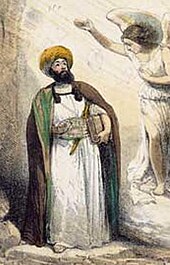In the pantheon of religious leaders, few figures evoke as profound a reverence as Muhammad, the prophet of Islam. His life and teachings have not only shaped the Islamic faith but have also left an indelible imprint on the broader tapestry of world religions. In the Bahá’í tradition, Muhammad occupies a singular position, celebrated not merely as a charismatic leader but as the final prophet in a lineage of divine messengers. This article endeavors to unravel the Bahá’í perspective on Muhammad, accentuating the significance of his prophethood, the unifying principles he espoused, and the transformative implications of these teachings for modern adherents.
At the core of Bahá’í faith lies the concept of progressive revelation. This principle posits that God, in His infinite wisdom, has chosen to reveal His will to humanity through a series of prophets, each one delivering teachings tailored to the needs and capacities of society at their respective epochs. Muhammad, in this continuum, represents the culmination of this divine guidance, his revelations found in the Quran serving as a definitive text for Muslims and a pivotal point for future messengers, including Bahá’u’lláh, the founder of the Bahá’í faith.
From a Bahá’í standpoint, Muhammad’s life encapsulates the essence of sacrifice, perseverance, and compassion. His role transcends that of a mere religious figure; he is viewed as a reformer who aimed to revive the spiritual ethos of society. Historically, the Arabian Peninsula was mired in tribal conflict and moral decay. Muhammad emerged as a beacon of hope, championing a message of monotheism, justice, and social equity. The Bahá’í teachings stress that his influence was not only confined to spiritual matters but extended into the realms of social justice and ethical guidance.
The concept of brotherhood is particularly poignant in Bahá’í teachings. Muhammad’s revelation inspired a sense of unity among diverse tribes, promoting the idea that all individuals are God’s creations and deserving of love and respect. Bahá’ís draw upon this theme to advocate for a global society free from sectarian violence and prejudice. The idea that each prophet—Muhammad included—builds upon the foundation laid by his predecessors fosters an appreciation for the interconnectedness of all religious teachings.
Moreover, Muhammad’s teachings elucidate the importance of moral rectitude. In the Quran, he emphasized virtues such as honesty, humility, and charity, virtues that resonate profoundly with the Bahá’í emphasis on moral development as a fundamental tenet of spiritual growth. To embody these qualities is a pursuit of lifelong dedication, reflecting a conscious effort to align one’s actions with divine principles.
Equally compelling is the concept of the “Seal of the Prophets,” a title bestowed upon Muhammad, signifying the conclusion of a prophetic cycle. This designation invites inquiry into the implications of finality in religious guidance. Bahá’ís interpret this notion not as a negation of future revelations but rather as an acknowledgment that Muhammad’s teachings provide the essential framework for subsequent prophets, including Bahá’u’lláh, who came to fulfill the promises made in previous scriptures.
The harmony of religious teachings is another pivotal theme within Bahá’í thought. The belief that all prophets—regardless of their historical or cultural context—provide congruent truths underscores the idea that discrepancies among religions arise from human interpretation rather than divine intention. This perspective cultivates an atmosphere of respect and appreciation for all faiths, recognizing the shared quest for truth among humanity.
In examining Muhammad’s role through a Bahá’í lens, it becomes apparent that teachings extend beyond doctrinaire beliefs; they solicit a deeper examination of divine purpose. Bahá’ís assert that the transformative power of faith must be actualized in action. Therefore, engaging with the teachings of Muhammad promotes a call to service and philanthropy in today’s world. By embracing the ethical imperatives illustrated in his teachings, adherents find pathways to foster societal progress and communal harmony.
Moreover, education plays a pivotal role in Bahá’í teachings, and Muhammad’s emphasis on knowledge acquisition serves as a historical precursor to this contemporary principle. The encouragement of learning and critical thought is integral to the Bahá’í faith, reinforcing the idea that true understanding leads to genuine faith. This idea echoes the Quran’s exhortations to observe and ponder the wonders of creation as a manifestation of divine artistry.
Critically, engaging with Muhammad’s teachings also compels Bahá’ís to confront and remedy the dichotomies that prevail in modern society—division, injustice, and ignorance. The enduring relevance of Muhammad’s message resounds with urgency; the principles of justice and unity wish to dismantle the barriers that fragment humanity into disparate factions. Bahá’í teachings urge adherents to emulate Muhammad’s commitment to altruism, promoting the welfare of all individuals, irrespective of their backgrounds.
In essence, the Bahá’í perspective on Muhammad as the last prophet is both intricate and enriching. By comprehending the significance of his teachings within the broader context of progressive revelation, followers are invited to embark on a journey of inquiry that transcends the superficial. It is an invitation to probe the depths of spiritual wisdom, urging adherents to not only appreciate the teachings of Muhammad but to integrate them into their lives as active participants in the evolution of human society.
Consequently, reflecting upon Muhammad’s life and the myriad of lessons it embodies, one is nudged toward recognizing the tremendous potential inherent in embracing the divine mission of fostering unity, celebrating diversity, and ultimately, striving for a society reflective of the world’s higher moral aspirations. In doing so, we arrive at a vantage point that champions not just coexistence but genuine communion among all of humanity.
